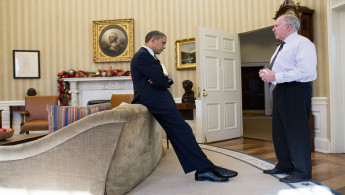CIA chief revealed as 'mastermind' of Iran deal
Last week, WikiLeaks started publishing emails from a personal email account used by CIA director John Brennan between 2007 and 2008, before he ascending to the helm of the intelligence agency where he has worked for more than 25 years.
The leaked emails reveal that plans for a US-Iranian rapprochement were laid out as early as 2008, and that Brennan played a central role in influencing President Barack Obama's policy towards Iran.
The bulk of the leaked materials are draft intelligence reports and proposals that were attachments to emails, and which do not carry the CIA logo or any security classification such as "secret" or "top secret".
The most important document leaked so far seems to be a document written by Brennan himself in 2008, which is specifically aimed at the election campaign of Barack Obama, who was a presidential candidate at the time.
The document reveals that the US-Iran rapprochement that culminated in the Iranian nuclear deal in June was largely based on Brennan's recommendations to Obama, revealing the current director of the CIA as the mastermind behind negotiations with Iran.
Furthermore, the document provides an insight into how top officials court the strongest presidential candidates during the race to the White House in order to secure positions for themselves in the new administration.
The Iran conundrum
| The US has no choice but to find a way to coexist - and to come to terms - with whatever government holds power in Tehran - CIA chief John Brennan |
In the draft, entitled The Iran Conundrum, Brennan starts by arguing that Iran will become a major international player in the decades to come and its behaviour will have a direct impact on short and long term US interests.
"The United States has no choice but to find a way to coexist - and to come to terms - with whatever government holds power in Tehran," Brennan writes. Iran has a large population, oil reserves, an important geostrategic location and nuclear ambition - none of which can be ignored by Washington.
However, Brennan also believes that Tehran should "come to terms with Washington" in a pragmatic and non-hostile manner - because its political and economic interests rest on a good relationship with the US and the West.
The intelligence official writes that there are many hurdles facing a US-Iran rapprochement, chiefly "the theocratic regime's nearly 30-year track record of engaging in transnational terrorism, both directly and indirectly, to advance its revolutionary agenda".
Brennan is of the view that Iran's ancient history and its Persian and Islamic Shia essence play a significant role in shaping its worldview and actions - adding that the country views itself as the protector of the Shia faithful against Sunni and other adversaries.
However, the intelligence chief indirectly admits that Iranian animosity towards the United States is party due to it being used as a "pawn of global politics, as illustrated by the CIA-engineered overthrow of Prime Minister Mossadegh in 1953" - and the subsequent installation of the Shah who ruled the country with an iron fist.
Brennan believes that the post-September 11 era represented a golden opportunity to build bridges and normalise relations with Iran, but that opportunity was lost due to "bombastic rhetorical broadsides" from either side and the inclusion of Iran in the "axis of evil" - despite its positive role in Afghanistan.
Recommendations
Brennan's document ended with a number of recommendations that stressed the importance of toning down US rhetoric against Iran and establishing direct talks with the country, as Brennan argues that talks through intermediaries are insufficient.
The intelligence official also suggested the appointment of a presidential envoy to deal with the Iranian issue, writing that such an appointment was "long overdue".
Brennan anticipates the criticism that such a suggestion might face, due to the fact that Iran is placed on the US State Department list of state sponsors of terrorism, writing that the US "has diplomatic relations with Syria, also on the list, and has appointed presidential envoys to North Korea and Sudan".
Brennan ends with the recommendation that the US should present Iran "meaningful carrots, as well as sticks", which seems to have set the stage for the tug-of-war that played out between two countries in the lead up to the nuclear deal.



